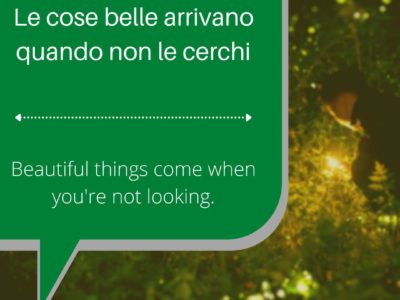
By
Last updated:
January 27, 2023
Every language has its beautiful words, but Italian takes the cannoli.
Listening to someone speaking Italian is like listening to a song. It’s a language of love, emotion and passion.
You can capture this beauty in your own Italian speech by learning some of the many musical words in the language.
In this post, I’ll show you 16 of my absolute favorite beautiful Italian words, plus pointers on how to use them!
Contents
- 1. Azzurro (Blue)
- 2. Cucchiaio (Spoon)
- 3. Basta (Enough, stop it)
- 4. Allora (So, well, then)
- 5. Arrabbiato (Angry)
- 6. Scarpetta (Bread used for soaking up sauce)
- 7. Culaccino (The ring made by a glass of cold liquid)
- 8. Meriggiare (To rest at noon in the shade)
- 9. Mozzafiato (Breathtaking)
- 10. Struggimento (Yearning)
- 11. Abbiocco (Food coma)
- 12. Zanzara (Mosquito)
- 13. Bellissima / Bellissimo (Beautiful)
- 14. Arrangiarsi (Make ends meet)
- 15. Menefreghista (Person who doesn’t care)
- 16. Spaghettata (Spaghetti party)
- Resources to Practice Italian Pronunciation
Download:
This blog post is available as a convenient and portable PDF that you
can take anywhere.
Click here to get a copy. (Download)
1. Azzurro (Blue)
How do you describe the sky on the most beautiful days? Azzurro. Quite possibly the most beautiful word for a color in any language, azzurro is the Italian word for “blue.” Just saying the word can bring to mind a bright, sunny day.
The double z makes a ts sound, much like in pizza (one of the best Italian foods!) and the double r lets you practice rolling them.
2. Cucchiaio (Spoon)
This fun-to-say word is one to pull out when you order soup. Cucchiaio is the Italian word for “spoon.” It may look like an intimidating word, but it’s easy once you know the rules!
The first c comes before a u, meaning it’s a “hard c” and it has a k sound. A c (or in this case, two) followed by an h is also hard.
To break this word down phonetically, you would say “kooky-i-o” with emphasis on the i.
Not so intimidating now, is it?
3. Basta (Enough, stop it)
A great exclamation for when you’re frustrated, basta is an Italian word for “enough” or “stop it!” A shortened version of the word abbastanza, which also means “enough,” basta is the word you use when you’re done dealing with something.
Whether you’ve added just the right amount of ingredients to a recipe, or you’ve reached the end of your patience, basta is the word to say (or yell!) to put a stop to something.
Basta is easy to pronounce because it’s just like pasta! Just say it with a little more vigor and you’ll be spot on.
4. Allora (So, well, then)
When you need a transition word, chances are the word you’re looking for is allora. Whether you want to say “so,” “well” or “then,” it’s the go-to for just about any filler word. Used on its own, allora can convey annoyance or impatience. It can also signify time, such as “then,” or “at the time.”
The great thing is that when you need a second to think, your allora can be stretched out a little. You can hold the long, rounded o for a beat or two, and when you’ve finally brought your next word to the tip of the tongue, you can finish with a soft rolled r and a short ah.
5. Arrabbiato (Angry)
It’s always great when a word sounds like its meaning. Much like the harsh, rolled, double r suggests, arrabbiato means “angry” in Italian.
Does it sound familiar? That’s because spicy pasta sauce is referred to as arrabbiata ! It’s a lot more fun eating spicy pasta knowing they call it “angry!”
6. Scarpetta (Bread used for soaking up sauce)
Food is an important part of Italian culture, so it’s no surprise that some of their beautiful words would pertain to food. Scarpetta is the bread that’s used to sop up the last morsels of a delicious sauce. It comes from the phrase fare la scarpetta, meaning “to make a little shoe.” This refers to the shape of the bread when it scoops up the sauce.
Scarpetta is another word that helps you practice short r rolls, which are referred to as a “flap.” It’s very similar to pronouncing a d in English. Follow that with a brief eh sound and a strong stop with the double t and you’ll sound like a local in no time.
Just remember, you only fai la scarpetta once you’ve finished your pasta!
7. Culaccino (The ring made by a glass of cold liquid)
Many languages have words for complex situations that English doesn’t have. Culaccino is a perfect example of this. This is the single word Italians use to describe the ring left on a table from the condensation of a cold glass.
Just like cucchiaio, this word starts with a hard c. Unlike cucchiaio however, the last c comes before an i, giving it a soft, ch pronunciation. Think of how you would say cappuccino !
8. Meriggiare (To rest at noon in the shade)
It’s midday, the heat of the day is at its highest and you find yourself seeking a nice spot of shade to relax in and escape the harsh sun.
Another example of a complex situation boiled down to one word, this entire scenario is the meaning of the verb meriggiare. In Italy, most shopkeepers close during lunchtime, because loro meriggiano (they’re resting)!
This is one of the easier words on the list to pronounce, despite the double soft r rolls! Remember, Italian is a phonetic language, so this word is pronounced the same way that it’s spelled!
9. Mozzafiato (Breathtaking)
The perfect word for the first time you see Italian scenery, mozzafiato means “breathtaking.”
Literally, mozzafiato means to cut off one’s breath. This is a good one to know when you go to Italy, as you’ll find most of the landscapes and scenery to be mozzafiato !
This word is another phonetically simple one. Most English speakers will associated mozza with cheese. It has the same ts sound from the double z as pizza. Fiato has a long a, giving it an ah sound. The t is the same as is used in English, except without an aspiration (that little breath you let out when speaking hard English consonants).
10. Struggimento (Yearning)
For such a beautiful word, struggimento has an artistically tragic meaning. The short translation is “yearning,” but it’s really more akin to a harrowing mix of sadness and yearning.
Another word whose definition seems to match its sound, struggimento sounds beautifully sad when said aloud. Combining the t and rolled r can be a bit of a stumbling block, but with practice, you’ll be able to say them together seamlessly.
Once you tackle that trick, you’re golden! The rest of the word is said phonetically: “ooh,” “gee” and “mento.” With a bit of practice, you’ll be able to articulate this complicated feeling more easily than you can explain it!
11. Abbiocco (Food coma)
I’m sure you’re familiar with the feeling that this word describes, especially if you’ve just had an Italian meal.
Abbiocco describes that drowsy, sleepy feeling that you get after eating a lot of food. Although this word is uniquely Italian, it does compare to an English “food coma.”
12. Zanzara (Mosquito)
This word may sound pretty, but its meaning is not so charming.
A zanzara is a mosquito!
13. Bellissima / Bellissimo (Beautiful)
The word that means “beautiful” in Italian is beautiful itself! You’ve likely heard this one before as it’s very common, but it rolls off the tongue so smoothly that I think it’s one of the prettiest Italian words out there!
14. Arrangiarsi (Make ends meet)
This one has a distinct ring to it, but its meaning may not always be so graceful.
Arrangiarsi means to arrange yourself or to make things work. Another way to put it is “making ends meet.”
In other words, things may not be easy, but you’re managing to get through it.
15. Menefreghista (Person who doesn’t care)
This distinctly Italian word sounds a little spunky itself, which is fitting since it refers to someone who simply doesn’t care.
This one could be seen as good or bad. Someone might have this attitude and be praised for their indifference to what other people think, but it could also be interpreted as someone being too lazy to care.
16. Spaghettata (Spaghetti party)
Of course the language associated with culinary excellence is bound to have some special food-related words, and this one might just be my favorite!
A spaghettata is a spaghetti party! You can spontaneously invite your friends over for a night-long affair of eating pasta and drinking wine!
This word may also sometimes be used to refer to the leftover pasta that you toss together to assuage your appetite after returning from a night out.
Resources to Practice Italian Pronunciation
Italian is a phonetic language that can be easy to master once you learn the rules. However, while some of the pronunciations are simple and familiar to English speakers, some will feel strange or difficult to utter.
For example, it’s easy enough to learn when a c should have a hard k sound (cuore/heart) or a ch sound (ciotola/bowl). Some Italian pronunciations you may already know, like the double z in pizza! (Most double consonants in Italian are pronounced with the same sounds as single consonants, just more forcefully!)
But not every sound is that easy. Sounds like gli (moglie/wife), gn (agnello/lamb) and the rolled r (marrone/brown) can take a lot of practice and patience to master.
So where can you learn proper pronunciations for Italian words?
Italian TV shows and movies or English programs with dubbed Italian audio are great for hearing proper pronunciations and repeating them. Italian music is also a fun way to practice. Learning to sing along with some great Italian songs will help you nail your pronunciations and even expand your vocabulary!
There are endless online resources for practicing your pronunciation. Most commonly used is YouTube, where you’ll find many different channels dedicated to learning, practicing or listening to Italian.
A virtual immersion platform is another option. FluentU, for example, takes authentic short videos in Italian and adds interactive subtitles that allow you to look up unfamiliar words instantly, hear how they’re pronounced, and add them to a multimedia flashcard deck.
It helps when you hear a new Italian word to try and pronounce it immediately after. Some language learning resources, like Pimsleur, are particularly focused on learning to speak a language by repeating what you hear.
Focus on whatever learning method seems to help you most. If you enjoy your Italian pronunciation practice, you’re more likely to keep at it!
The Italian language is magical. It flows like a song. This list is just a small sample of the beautiful words Italian has to offer. With pronunciation practice, in no time you’ll be saying these words (and all kinds of other beautiful Italian words) like a local!
Download:
This blog post is available as a convenient and portable PDF that you
can take anywhere.
Click here to get a copy. (Download)
Beautiful Italian words
Of course, beauty is subjective, so we’ve prepared a selection of our favorite Italian words. We hope you like them too!
Some of them are beautiful to us because of how they sound. Others because of what they mean.
For now, don’t worry about their meaning.
Focus on their spelling and pronunciation (which you can check by clicking on the word).
Have fun reading them out loud!
- Pensierino
- Zanzara
- Farfalla
- Pantofolaio
- Addirittura
- Lucciola
- Rocambolesco
- Furbo
- Solare
- Stuzzicadenti
- Agio
Some of them refer to insects, some are adjectives, and some are nouns.
Let’s find out what they mean.

Beautiful Italian words and meanings
Let’s now look at what these words mean:
Pensierino
A pensierino is a small present/gift.
It can also refer to a thought. Especially in the following context:
farci un pensierino
to think about something/to consider something.
Zanzara
Zanzara means mosquito. It’s a very onomatopoeic word because of the sound zzz.
Farfalla
Farfalla simply means butterfly.
Pantofolaio
Literally, “seller of slippers”. The English equivalent of pantofolaio would be “couch potato“.
It’s used to refer to someone who is very lazy and likes to stay home with slippers on.
Addirittura
This word is great because of how it sounds but also because of how useful it is.
It basically means even, frankly, or downright.
It can also be used on its own as an expression of surprise, similar to “really?!”.
Lucciola
Lucciola just means firefly.
Rocambolesco
Rocambolesco is a borrowed word from the French rocambolesque.
This word comes from a character called Rocambole, who was a daring adventurer invented by the author Pierre Alexis Ponson du Terrail.
We use it to describe a daring, epic, fantastic, gripping, and incredible adventure or event.
Furbo/furba
This is a very Italian word. It’s used to refer to someone astute, cunning, and smart.

How to Learn Languages Fast
We also use it to refer to someone who gets smart or messes with someone else.
Solare
This word literally means sunny.
It is a beautiful way to describe someone happy and bubbly.
Stuzzicadenti
Stuzzicadenti means toothpick.
It’s made of two words: stuzzica + denti, meaning tease + teeth, so its literal translation would be something like teethteaser.
Agio
Agio means ease and comfort.
We mainly use it in this context:
sentirsi a proprio agio
To feel at ease
Beautiful Italian words: examples
Here are some examples:
Ti ho portato un pensierino.
I brought you a little gift.
Ci farò un pensierino.
I’ll think about it.
Ci sono troppe zanzare qua!
There are too many mosquitoes here!
Guarda i colori di quella farfalla.
Look at that butterfly’s colors.
Marco è proprio un pantofolaio.
Marco is a real couch potato.
A: Gli hanno proibito di uscire di casa.
B: Addirittura?!
A: They’ve forbidden him to leave the house.
B: Really?!
Le lucciole sono degli insetti speciali.
Fireflies are special insects.
Che situazione così rocambolesca!
What an incredible situation!
Non fare il furbo!
Don’t get smart!
Paola è una persona solare.
Paola is a bubbly person.
Mi puoi passare gli stuzzicadenti?
Can you pass me the toothpicks?
Con lui mi sento a mio agio.
I feel at ease with him.
Still translating in your head? Wanna speak Italian for real? Check out Stefano’s courses to think directly in Italian and become fluent fast!
What are the prettiest Italian words? Some beautiful Italian words are: Pensierino, Zanzara, Farfalla, Pantofolaio, and Addirittura.
What are cute Italian words?
We will look into these pretty Italian words and maybe, use them in the future with our new Italian friends.
…
This is true in so many ways.
- Amore mio – My love.
- Tesoro mio – My darling or my sweetheart.
- Bella – beautiful.
- Bello – handsome.
- Ti amo – I love you. …
- Ti amo così tanto – I love you so much.
What are some beautiful Italian sayings?
Ogni giorno ha il suo amore e dolore./Every day she has her love and her pain. Amore non è senza amaro./Love is not without bitterness. L’amore non è bello se non è litigarello./ Amor senza baruffa, fa la muffa./Love is not beautiful if it is not a quarrel. / Love without a quarrel, it makes mold.
What is a beautiful girl called in Italian?
Una bella ragazza – a beautiful girl.
Why do Italians say Alora?
Allora (so, then, well) is one of those filler words that’s highly useful when thinking of what to say in Italian. It buys you a little time and tells the listener you’re thinking things over, especially when used by itself, or to introduce a sentence.
What’s the Most Beautiful Language in the World? | Easy Italian 85
What is tutti mean in Italian?
It’s made up of tutti, the word for ‘all’ or ‘everyone’, plus quanti – which usually means ‘how many’ or ‘as many’, but in this case just think of it as adding emphasis to ‘everyone’. It’s the difference between saying ‘everyone’ (tutti) and ‘every single one’ (tutti quanti). Tutti quanti la pensano come me.
Why does Italy say Prego?
You are welcome
It basically is an automatism and it is considered the cornerstone of basic politeness. If someone says “grazie” to you and you don’t reply “prego,” you might be considered rude, so watch out for that!
What is Bonita in Italian?
«Pretty, beautiful, lively»
What is Italian Bella?
Bella is the feminine singular for “beautiful” in Italian.
How do you say beautiful in Sicilian?
Trùoppu Bedda/u – Beautiful
So beautiful in Sicilian is Trùoppu Bedda – if your partner is female or identifies as such – and Trùoppu Beddu – if your partner is male or identifies as such.
What is a famous Italian saying?
Mamma mia is a common Italian saying
This Italian saying is an exclamation usually implying surprise or impatience, similar to the phrase “my goodness” in English.
What is the most popular Italian word?
The most used Italian word is arguably cosa, which translates in many ways in English — including “what”, “thing”, and “matter” — depending on its inflection, grammatical function, or the overall context of the sentence.
What is an Italian beauty?
Italian women are known to have an intense gaze, olive skin, dark eyes, and dark hair. High cheekbones, a small or Roman nose, long hair, and soft lips are considered beautiful in Italy.
How Italian call their lovers?
In Italian, you say mio amato for men and mia amata for women. When talking about your beloved with someone else, you can refer to them as il mio lui (literally “my him”) if he is a man, and la mia lei (literally “my her”) if she is a woman.
What is the most romantic thing to say in Italian?
10 more ways to say I love you in Italian
- Amore mio – my love.
- Cuore mio – my heart.
- Tesoro mio – my darling.
- Baciami! …
- Sei tutto per me – you’re everything to me.
- Ti penso ogni giorno – I think about you every day.
- Sei il grande amore della mia vita – You’re the love of my life.
- Ti amerò sempre – I’ll always love you.
What do Italians name their dogs?
Top Italian Dog Names
- Bella (beautiful)
- Biscotti.
- Cannoli.
- Cappuccino.
- Dante.
- Dolce (sweet)
- Enzo.
- Fabio.
What does Luna mean in Italian?
Luna is an Italian and Spanish given name of Latin origin. It means moon.
What is Molto bello?
[Italian] masc. Very Handsome.
What is Bella Vita mean?
«Bella vita» means beautiful life in Italian. «Bella Vita»
What is a senorita in Italian?
signorina. / (ˌsiːnjɔːˈriːnə, Italian siɲɲoˈrina) / noun plural -nas or -ne (Italian -ne) an unmarried Italian woman: a title of address equivalent to Miss when placed before a name or madam or miss when used alone.
What is fish called in Italy?
Just as in English, the word pesce (masculine, plural: pesci) can refer to the living aquatic animal, as well as any kind of culinary dish made out of the animal.
What is the meaning of Mamacita?
The literal translation of mamacita is «little mother» but the figurative and more accurate translation is «hot momma.» The moniker is never really used to describe an actual mother, a genuine mamá or mamita. Instead, the word is inextricably linked to a man’s perception of a woman as an object of sexual desire.
What does Opa mean in Italy?
English translation:Tender Offer.
What does Ciao Bella?
Ciao Bella translates to «Hello, beautiful» in Italian.
Why do some Italians say Grazia?
You say grazie when someone is offering you something that you want to accept, but you also use it if you want to refuse. Unlike English, there is no difference such as Yes, please/ No thanks in Italian. Italians say grazie in any case, both if they want to accept or to refuse.
Mine, i’m not italian so i don’t know why, is arcobaleno. Quite beautiful this one, but what about your native opinion? I heard about a strange case of you approving a new word recently that a kid created, petaloso, i found that fascinating!For me yours is the most beautiful language in the world!
level 2
On a similar note, all words that are recursive, i.e. their meaning describe the word itself.
Arzigogolato is, as a word, very complex and somehow unnecessary. Which is exactly the meaning of arzigogolato.
Desueto is an old and not very used word. Desueto means exactly «old and not very used».
level 2
username does not check out
level 1
Obnubilamento. Che bellezza.
level 2
Ho sempre preferito la parola «luamaro».
level 2
· 6 yr. ago · edited 6 yr. ago
Cinefilo
roboante
tutte le varianti di scoreggia (put, peto, loffia, ciana,ecc)
miasma
pernicioso
purulento
pus
wow ci sono un casino di belle parole schifose che iniziano con la P
level 1
My personal favorite: aggiotaggio
level 1
I’m astonished that no one yet said
Angelino Alfano
But also
Sternocleidomastoideo
level 1
Esticazzi (roman expression for «who cares»)
level 1
prisencolinensinainciusol
level 1
Precipitevolissimevolmente.
Real word.
level 1
Aiuole (flower beds): it contains all the vocals
«Petaloso» was not approved as a new word. The «Accademia della Crusca», an istitution of italian linguists, replied to the kid who invented it that, in case people start to use it, it could become a word of the dictionary.

In this article, we are going to look into some of the most common Italian words and what they mean. So let’s enjoy this and hopefully get to learn Italian using a new perspective.
We will look into these pretty Italian words and maybe, use them in the future with our new Italian friends.
LOVE WORDS
There is a reason behind what people say that Italian is a romantic language. This is true in so many ways.
- Amore mio – My love
- Tesoro mio – My darling or my sweetheart
- Bella – beautiful
- Bello – handsome
- Ti amo – I love you. You should keep in mind that this word is only used to express a strong feeling of love. Mostly used between partners.
- Ti amo così tanto – I love you so much. The phrase so much is represented as cosi tanto.
- Ti voglio un mondo di bene – this phrase means “I love you a lot”, plainly it means “I want a world of good for you.” It is a few notches down from the phrase Ti amo.
- Ti voglio bene – I love you/ I wish you well. This is best used during the early stages of a relationship, family, and friends.
- Significhi molto per me – You mean a lot to me.
You can “esprimere il tuo amore” (express your love) in different ways to “i tuoi amici o la tua famiglia” (your friends or family).
You can also try a little bit of flirting using pretty Italian words as you learn Italian.
Adoro il tuo sorriso, mi rende la giornata felice, which technically means I love your smile, it makes my day.
Ho iniziato a credere nell’amore la prima volta che ti ho visto. This means I started to believe in love the first time I saw you.
If you would to make someone blush, you should consider using some of these words to describe them.
- attraente: which is the word for attractive
- seducente: seductive
- affascinante: charming
ITALIAN GREETINGS AND ETIQUETTE
Around the globe, there are many ways in which we can use to greet people. Here are some of the words that one may use when you learn Italian.
- Ciao – hello; goodbye
- Ci vediamo – see you later
- Buongiorno – good morning
- Per favore – please
- Buona giornata – good day
- Grazie – thank you
- Grazie mille – thank you very much
- Buona sera – good evening
- Piacere – nice to meet you
- Prego – you are welcome
- Come va – how are you?
- Buona notte – goodnight
- Arrivederci – goodbye
For example:
Buongiorno, piacere di conoscerti. (Good morning, it is nice to meet you.)
Grazie mille. Buona giornata. (Thank you very much. Have a good day.)
ITALIAN FOOD WORDS
Who does love Italian cuisine when it sends your taste buds to an overdrive? Below are some of the words that are used to describe good food (buon cibo) and food names.
Questa torta è così buona! Cosa ci hai messo dentro? Which means – this pie is so good! What did you put in it?
- Torta – pie
- Panini – Sandwiches
- Dolce – dessert
- Gelato – ice cream
- Pollo fritto – fried chicken
- Mela – apple
- Anguria – watermelon
- Carne – meat
Food vocabulary
- Squisito! – delicious or exquisite
- Buono – good
- Passa il sale – pass the salt
- Posso assaggiare – can I have a taste?
- Buon appetito – enjoy your meal
- Ottimo! – Really good/ excellent. Used mostly when describing food.
Example:
Ottimo! non è comune trovare una pizza così buona ; which is: really good! It is not common to find such good pizza.
Are there any other food names or phrases that you know of? Write them down on a “pezzo di carta” (piece of paper) and ask a friend who’s good at Italian to help you look at them.
Fashion/ clothes names
- Vestito – dress
- Camicia – shirt
- Giacca – jacket
- Vestito da sposa – wedding dress
- Maglione – sweater
Example:
La donna porta un maglione rossa. Which means the woman is wearing a black sweater.
L’abito da sposa è così bello. Which means the wedding dress is so beautiful.
What are some of the other clothes wear that you know in Italian?
MOST COMMON ITALIAN WORDS
- Mamma mia – oh my gosh!
- Felice anniversario – Happy anniversary
- Che figo – that’s cool
- Buon compleanno – Happy birthday
For other beautiful Italian words that may be helpful in your learning journey, feel free to discover our list of Italian slang words.
Remember the more vocabs you learn, the better you can start constructing sentences like a native.
Now that you know the 50 most beautiful Italian words you need to learn, discover the 10 best Italian movies that are perfect to learn Italian!
EXERCISES
Do you want to learn Italian? Sign up for our online courses!
Follow us on YouTube, Instagram and Facebook!






